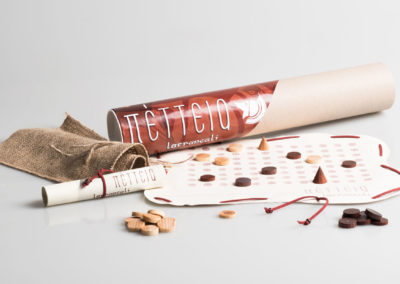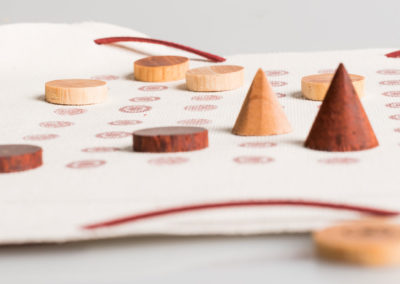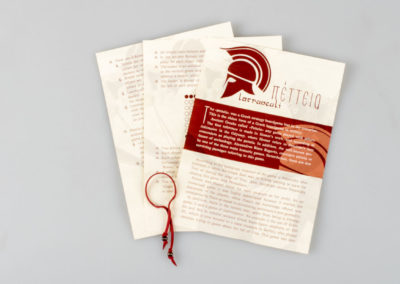Petteia of Achilles & Plato
$40,00
«War is the father and king of all.» – Heraclitus
Probably the most sophisticated board game that the Greeks invented to sharpen their minds, was the game of Petteia (Lantruculi in Latin). It is among the oldest board games in ancient Greece, and it is considered by many as the ancestor of modern chess. No matter whether we accept such a claim or not, it is definitely an amazingly clever game whose origins are lost in the mists of time.
There are many references to Petteia in ancient sources, such as in Homer’s Odyssey, and it is no by chance that many celebrated historians (including the legendary professor of archaeology, Dr. Ragavis) considers it to be one of the main Homeric board games.
As a strategy game, it was highly respected, as it was ideal for practicing mind sharpness. The legendary Greek philosopher, Plato, once said that mastering the game of Petteia was equal to learning mathematics and geometry. Besides being both a fun game and an educational tool, it was also used to predict the future as it is documented on an ancient Greek amphora. More specifically, on finding dated to 450 BC, Achilles and Ajax are being portrayed playing Petteia and trying to guess the outcome of the Trojan War.
It was such a high-valued strategy board game that the Romans embraced it almost immediately, becoming passionate players and further enriching its game’s mechanics by adding an additional piece of greater importance to the rest, the one called the Leader. This version of the game, a Petteia with a Leader piece, was named Lactus Latruncularum or simply Lantruculi.
βραβευμένα παιχνίδια όξυνσης του νου
από την αρχαία Ελλάδα σε όλο τον κόσμο
Ιστορική Ακρίβεια & Ποιότητα Κατασκευής

Ανεξαρτήτως αν ήσουν απόγονος ευπατρίδη (πλούσιου και μορφωμένου) ή γεωμόρου (αγρότη), ο αρχαίος Έλληνας είχε την ευκαιρία να ξεχωρίσει για την ικανότητα να “κερδίζει” μάχες (βίαιες ή αναίμακτες) και να ηγείται. Και σε αυτή του την προσπάθεια, η στρατηγική σκέψη αποτελούσε το πλέον πολύτιμο αγαθό.
Ως εκ τούτου, στην Αρχαία Ελλάδα αναπτύχθηκαν πλήθος εκπαιδευτικών παιχνιδιών, μέσω των οποίων οι νέοι όξυναν τον νου και αποκτούσαν κριτική σκέψη. Δεν είναι τυχαίο που ο Λυσίμαχος, δάσκαλος του Μεγάλου Αλεξάνδρου, επινόησε ένα παιχνίδι για να εξασκείται ο τελευταίος. Στο παιχνίδι αυτό τον καλούσε να υποδυθεί τον Αχιλλέα, ο οποίος σταδιακά απέκτησε αρχετυπική μορφή (ως ο «ευγενής πολεμιστής») στο νεανικό μυαλό του Μεγάλου Αλεξάνδρου. Όλοι γνωρίζουμε τη μετέπειτα εξέλιξη του Μακεδόνα βασιλιά.
Ενδεικτική βιβλιογραφία
Brouwers, Josho (2020). Ancient Greek heroes at play, Ancient World Magazine.
Kowalski, Wladyslaw. (2004). Board Games of the Ancient World. P Art and Culture. Autumn. 2-25.
Kurke, L. (1999). Ancient Greek Board Games and How to Play Them. Classical Philology, 94(3), 247-267.
Metcalfe, Tom (2018). 16 of the Most Interesting Ancient Board and Dice Games, Live Science.
Schädler, Ulrich. (2009). Pente grammai -- the ancient Greek board game Five Lines.
Woods, Stewart (2012). Eurogames: The Design, Culture, and Play of Modern European Board Games. p. 17. ISBN 9780786490653.
Λάζος, Χρήστος Δ. (2002). Παίζοντας στο χρόνο: αρχαιοελληνικά και βυζαντινά παιχνίδια 1700 π.Χ.-1500 μ.Χ., Εκδόσεις Αίολος.
Πλάτωνας. Πολιτεία, συγγραφή γύρω στο 375 π.Χ.
τα παιχνίδια όξυνσης του νου με μία ματιά
Ιστορική πιστότητα
Οδηγίες χρήσης
Περιλαμβάνει
100% θετικές κριτικές
Προσοχή στη λεπτομέρεια
Αποστολή παγκοσμίως
Ready to own a piece of ancient wisdom?
Petteia of Achilles & Plato
$40,00




